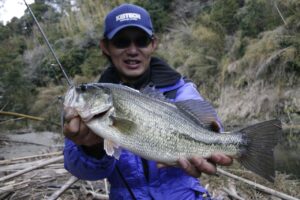Why do you love fishing? Japanese perspectives.
Have you thought about why you love fishing?
For many people, it is not an easy question to answer. You may answer that you love it just because you love it. I know that there are many aspects in fishing and it is not easy to explain it in short.
In this article, I take some quotes from famous Japanese anglers, who have expressed their love of fishing. Then I will summarize what aspects of fishing are the most important for Japanese anglers.
Uneme Tsugaru (1667 - 1743)
“The person with benevolence enjoys the calmness, and the person with knowledge enjoys the water.”
仁者は静を、智者は水を楽しむ。
Uneme Tsugaru lived in the Edo period, and he wrote Japan's first fishing guidebook. He was a literated samurai who was devoted to fishing. You can view the handwritten copy of this book in this archive.
This quotation was written in the beginning of his guidebook. In that era, religious knowledge was very important and he expressed his idea of the pleasure of fishing using the concepts of religions, Confucius and Buddhism.
Confucius came to Japan from China in AD 285. It was taught through the text of Lunyu (Confucius Analects), a compilation of Confucious’ words and attitudes.
In this text, there is a famous phrase, “The person with benevolence enjoys the mountain, and the person with knowledge enjoys the water.” This teaches that the people with goodness are calm and not agitated by small matters and they often accept their fate. On the other hand, people with knowledge let things flow like water smoothly flowing down, or they are doing many things next to next all the time. Uneme seemed to interpret it and expressed the above quoted words.
His quote means that the good people want to have a quieter life or like slow and steady things, while the people with knowledge of fishing enjoy the time at the water, namely fishing. When the person is in fishing, this person uses his knowledge to catch fish and continuously changes his tactics like it is needed to face the changing situations.
Koseki Sato (1888 - 1956)
He was a writer and a journalist, who published a lot of fishing related writings. In one of his vast numbers of fishing essays, he wrote this passage.
“I saw that my son, away from the dust of the town, breathed in the pure air on top of the vast water in front of himself and that he was freely in the middle of nature.
I think that fishing helps children grow up healthy. I want my son to have a bright future with it.”
(Original text can be read from this archived page.)
From this quote, we can see that the important thing in fishing was to be in pure nature, even at that time. The quoted essay was published in 1938.
Kendo Ishii (1865 - 1943)
As an editor and a writer, he had written a lot of essays on fishing. One of them is summarized in his work, “Kendo’s Rules of Fishing” published in 1906.
“Do not wish to catch as many pieces of fish as you can, but pursue to have as much pleasure as possible in fishing.
The purpose of fishing is to catch fish, but the true purpose is not about fish itself but the pleasure and fun of catching it. Therefore, it is to achieve the purpose that you use the ideal method of fishing, with using the finest baits on your best rod, under the best fishing conditions. There is no reason to ask about the size or the quantity of fish.” (Original Text is from this archive.)
It seems almost the words of mastery, coming from the religious guru. For normal anglers, once you get the continuous bites, you become crazy to get as much as you can. Mr. Ishii is asking us about it.
Ken Kaiko (1930 - 1989)
He was a famous post WW2 novelist who had written a lot of journalistic essays on the Vietnam War, travel essays, and fishing writings, not only the award winning novels.
His writings on fishing are eternal entertainment for anglers, with wit, funny and deep insights.
He described fishing like this.
“An angler appears very calm on the water, but his mind is full of wistful thoughts. These are in his mind then: about the fee of his writing, about the due date, the faces of editors, other things of erotic, vulgar, inhumane, and violent. His mind is boiled with these just like a boiling pot in hell. But once he gets a fish, all these disappear immediately and pure oblivion comes up.” (From his essay book, “The Earth Goes Around a Glass” published in 1981)
When you are missing the bites, you start to think about something to change, then start to get irritated, even after this, your mind goes somewhere else from the water.
What every one of us knows is the feeling Mr. Kaiko explains when a fish comes onto your hook.
In this article, I picked only four anglers, but it reflects the taste of angling or attitude to fishing in Japan very well. Of course, eating is one of the most important factors in fishing for Japanese. It is a part of the sport, just like the anglers outside Japan are enjoying the games of fishing.
In future articles, I will introduce above people in detail with some translations of their work, to know deeper about what brought them to have such thoughts on fishing.

